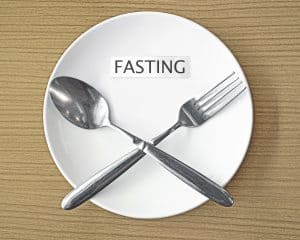Intermittent fasting for weight loss is safe and effective.
Fasting is not a new practice. Fasting is a practice that is older than many modern religions. It is a central part of many religious practices, but the idea of using it for weight loss is relatively new. Regardless, fasting is beginning to capture the attention as a possible solution for obesity. In fact, you can find hundreds of articles in health magazines every year that tout the unproven benefits of fasting. These benefits are ranging from flushing toxins from your body, improving energy, reducing depression, and losing massive amounts of fat in amazingly short periods of time. The question I have is whether it is safe and effective for weight loss.
There is no doubt that fasting or the act of eating little to no foot will result in weight loss. This concept is true in the short term, but what about the long term and do the risks far outweigh any benefit to the point fasting could cause more harm than good. A recent study was performed to examine the safety and efficacy of weight loss via intermittent fasting or continuous energy restriction in adults with diabetes and overweight or obesity[1]. The study was relatively small with only ten participants. The subjects were diabetics that were overweight or obesity. The subjects were randomised to either severe energy restriction on two 24-hour periods per week with five days per week of eating to appetite or continuous moderate energy restriction for 12 weeks. Participants were followed to a total of 12 months. During the study, no adverse events occurred to any of the subjects. The rates of hypoglycaemia were unchanged. Body weight was reduced from baseline by both intermittent fasting and continuous energy restriction. Central abdominal or truncal fat was also reduced by these two interventions. Blood pressure and circulating concentrations of HbA1c and lipids remained unchanged from baseline.
The bottom line: Findings suggest that both intermittent fasting or continuous energy restriction are safe and effective weight loss for diabetic patients that are overweight or obesity. There is no reason to think this effect is limited to diabetics. The number subject is limiting, and more research is needed, but this finding is promising.
References
-
[1]J. Overland et al., “The safety and efficacy of weight loss via intermittent fasting or standard daily energy restriction in adults with type 1 diabetes and overweight or obesity: A pilot study,” O, Nov. 2018 [Online]. Available: 10.1016/j.obmed.2018.11.001″ target=”_blank” rel=”noopener noreferrer”>http://dx.doi.org/10.1016/j.obmed.2018.11.001







Leave a Reply